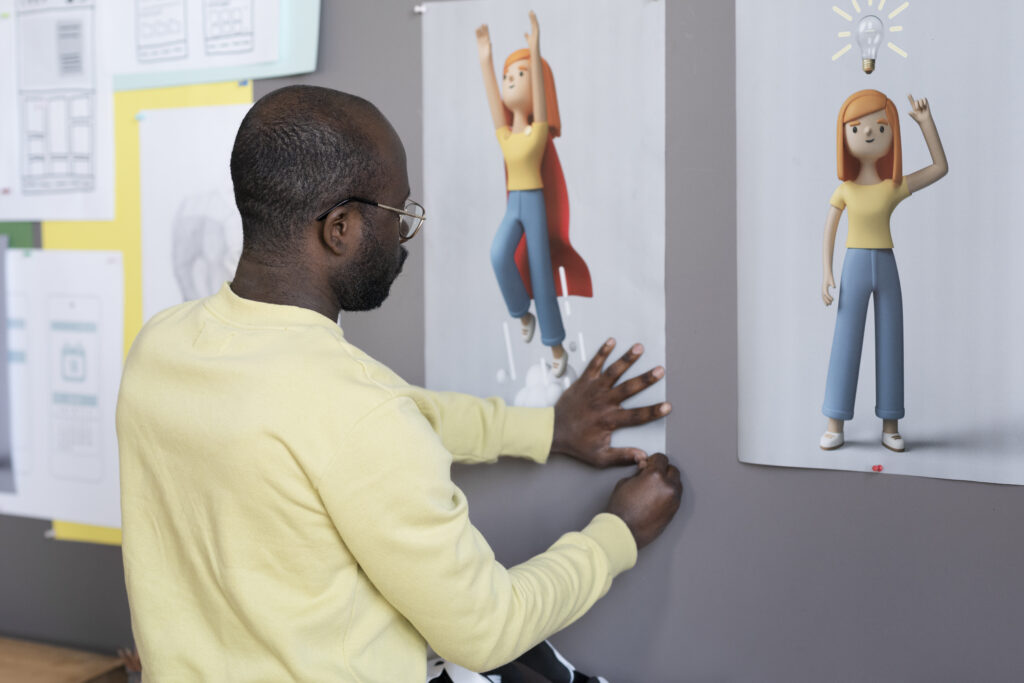In today’s evolving workplace, especially within creative and fast-paced industries like digital marketing, Leadership is no longer just about giving instructions and expecting results.. At Africa Digital Agency, we’ve seen firsthand that people thrive when they feel connected, respected, and understood. But here’s the tricky part: how do you maintain authority without creating distance? How do you stay approachable without compromising your leadership?

This is the fine dance between being “the boss” and being “the buddy.” And for many business owners and leaders, especially those leading small teams or startups, this balance can make or break your work culture. This piece will teach you how to wear both hats with grace, confidence, and intention.
Understand Your Leadership Identity: Who Are You?
Before you start balancing friendship and leadership, you need to first understand your own leadership style. Are you naturally empathetic and relational, or are you the more results-driven, no-nonsense type? Knowing where you fall on the spectrum will help you identify what you need to do more of and what to tone down.
At Africa Digital Agency, we deal with diverse clients, fast deadlines, and a need for creative excellence. That means our team leaders must be adaptable. For instance, during a campaign launch, a team leader might need to switch from being a flexible collaborator to a deadline-driven decision-maker. But outside those intense moments, the same leader can (and should) be relatable and open.
In Nigerian business culture, there’s often a strong emphasis on hierarchy. But modern leadership is shifting. Even the oga at the top can show vulnerability. In fact, it builds more loyalty than fear ever will.
Set Clear Boundaries Without Being Cold
Let’s be honest, Nigerians are naturally warm and communal. We greet our colleagues with “My guy, how your body na?” or “How your night dey?” It’s in our DNA to treat people like family. But when you’re the leader, that closeness can blur lines quickly.
To keep things professional without turning into a cold, warlord leader, you need to set healthy boundaries early on. This doesn’t mean creating walls. It means being clear about your role, your expectations, and your non-negotiables.
For example, it’s okay to gist with your team during lunch breaks. But if someone consistently submits work late or misses deadlines, don’t ignore it in the name of friendship. Pull them aside respectfully and remind them of their responsibilities. Friendship doesn’t cancel accountability, it supports it.
At Africa Digital Agency, we use structured communication tools like Slack and Zoho to keep things transparent. Tasks are assigned with clear deadlines. Praise is given publicly, while corrections happen privately. This balance keeps things respectful and prevents favoritism.
Avoid discussing sensitive personal issues with team members you lead. It may feel like bonding, but it can later be used against you or cause an imbalance in how others perceive your professionalism.
Cultivate Emotional Intelligence as a Superpower
Being emotionally intelligent is the bridge between being liked and being respected. It’s what helps you read the room, listen beyond words, and know when to coach versus when to correct. Leaders with emotional intelligence are better equipped to manage stress and conflict within their team. As a leader, you’re not just managing timelines, you’re managing creative minds, emotions, and energy levels. One team member might perform best with weekly check-ins. Another might need daily reassurance. You won’t know unless you pay attention.
Emotional intelligence is about asking, “What’s going on beneath the surface?” Is that designer missing deadlines because they’re lazy, or are they going through something? Is your social media manager suddenly withdrawn? Maybe she’s burnt out, not rude.
At Africa Digital Agency, we encourage empathy in leadership. One of our values is “People First,” because we know that behind every campaign is a person trying their best. We celebrate wins with the same energy we use to support our teammates through losses.
Practice active listening. When someone’s talking, don’t just wait for your turn to respond. Really listen. Reflect their concerns. Ask clarifying questions. You’ll build trust—and that’s the real secret sauce to great leadership.
Build a Culture of Respect, Not Fear
Many Nigerian leaders were raised in a system that equated fear with respect. You feared your headmaster, your parents, even your church elder. So it’s easy to fall into that same leadership model. But today’s workforce, especially Gen Z, doesn’t respond to fear. They want fairness, clarity, and purpose.
Respect doesn’t mean being soft. It means being firm but fair. Being able to lead with confidence while still making your team feel seen. Respect is also earned through consistency. You can’t be playful one week and then randomly start shouting the next. People won’t know which version of you to expect and get used to
You can promote open feedback loops where Junior staff can respectfully challenge ideas without fear, interns are encouraged to pitch during meetings. This flat structure makes everyone feel like they matter, and when people feel valued, they give more and stay. One of the ways to retain employees is by making them feel valued and heard. Check here for other employee retention strategies
Be Consistent: Your Energy Shouldn’t Be a Guessing Game
Nothing confuses a team more than an unpredictable leader. If you’re warm and chatty one day, but cold and silent the next, your team will start to walk on eggshells. That’s not leadership, that’s emotional instability.
Consistency is what gives your team security. When they know what to expect from you, they’re less anxious, more productive, and more loyal.
For a business owner whose business is online, there are already a lot of moving parts: client feedback, tech glitches, and algorithm changes. Your team shouldn’t also be trying to figure you out. Let your mood be stable, even when the market isn’t.
We encourage leaders to check their emotional temperature before stepping into the (virtual or physical) office. If you’re not in the right headspace, take a pause. Don’t transfer that tension to your team.
Leadership tip: Create routines. Monday morning check-ins, Friday team shout-outs, and monthly performance reviews. These touchpoints help everyone stay aligned and reduce surprises. Rituals build rhythm, and rhythm builds trust.
Blend the Two Roles with Intentionality
Here’s the truth: You don’t need to choose between being a boss and being a friend. You can absolutely be both as long as you’re intentional.
On Monday morning, you’re focused on strategy, KPIs, and deliverables. But on Friday afternoon, you can switch gears, laugh with your team, celebrate wins, or ask how someone’s mum is doing. Leadership doesn’t mean emotional distance. It means emotional maturity.
Want to host a game day at work? Go ahead. Want to grab lunch with your staff? Sure. Just don’t compromise your leadership voice in those moments. You can be approachable without being a pushover.
At Africa Digital Agency, we’ve learned that the best teams are those that laugh together, cry together, and still get the work done. We believe in community, not just structure.
Final pro tip: Practice “compartmentalized connection.” Be emotionally available without being emotionally dependent. Build trust, not dependency.
Conclusion: Be Human First, Leader Always
Balancing leadership and friendship is not about performing two roles; it’s about being your full, human self while leading with intention. You’re not just a title; a boss. You’re a culture-setter, a trust-builder, a vision-carrier.
Your ability to lead with both authority and empathy is what will make your team thrive. And in today’s world, where creativity, people, and results go hand-in-hand, this balance isn’t just helpful. It’s necessary.
So go ahead, be the boss on Monday, and the friend on Friday. Your team deserves both. Don’t forget to reach us here for your brand advertising


No comment yet, add your voice below!